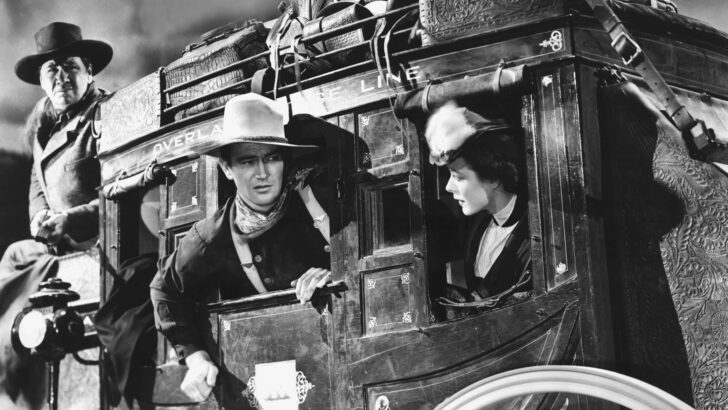Faith in film
What’s a western doing on a Vatican film list? A genre that typically praises the triumph of individualism and a non-conformist Protestant culture might seem ‘anathema’. But Stetsons, stoic heroes, fantastic landscapes and engaging action have some Vatican sanction with its inclusion of the iconic western Stagecoach (1939) on a 1995 list of important films.
Directed by John Ford – son of Irish Catholic migrants – and starring deathbed convert, John Wayne, it resurrected the Western. Ford was determined to make it, but studios wouldn’t bite; it didn’t help that he wanted a nobody called John Wayne to star. Thank God, Ford got his way, the result being an exciting, charming and mostly wholesome drama and a legendary Hollywood figure in Wayne.
Special
But what makes it so special? Why is it on the Vatican list, under the ‘art’ section (the other two being ‘religion’ and ‘values’)? Those questions arguably have the same answer: the quality of the filmmaking matched with a Christian-inspired vision of society.
The first thing to say is that this is a very enjoyable film. I watched it with a small group who had never seen a western before and all were immediately won over. The balance of comedy, action and character drama ensure your attention won’t wander, as does the action-oriented set-up: a stagecoach carrying a motley crew – a cross-section of American life – attempting a fraught journey across what is effectively a warzone in the late 1800s.
The most troubling element of the film – the characterisation of Native Americans as savages – is also the source of its excitement. They provide the threat, forcing these unlikely allies to ignore their differences and band together.
Their journey leaves them quite alone, with only their guns and wits to defend them as they cross the remarkable landscape of Monument Valley. Appropriately named, this landscape mixes monumental stone structures and vast open spaces, beautiful, austere and forbidding.
Here the ‘Indians’ spring their trap, with as exciting a chase sequence as any Fast and Furious could offer. The stunts are frightening, with riders jumping off horses or falling under a fast-moving carriage, while bullets and spears and arrows whistle back and forth across the screen.
Heart
Will they survive, is the drive of the action; but the heart of the drama are these fraught relationships, between an American lady and a woman-of-the-night; between the egalitarian outsider and the aristocrat from the South; between a virtuous whiskey salesman and an alcoholic doctor.
At the start of the film, we see all these characters in the context of the times. The alcoholic and prostitute, Dallas, are kicked out of town by stereotypical puritan types; the lady wants to see her husband and the aristocrat wants to protect her; the whiskey salesman is returning home, while a banker with something to hide joins them.
After they leave town, we meet the rugged hero in a famous close up that introduced John Wayne to the world. He is forced on board by the death of his horse, with his mission being to avenge the death of his brother by facing down his murderers.
John Wayne, though he receives second billing, is the undoubted star as Ringo Kid. He’s ruggedly handsome, honourable in a ‘man’s gotta do’ way and the firmest opponent of the narrow social mores the film attacks.
It’s he, the drunken doctor and the whiskey salesman – unlikely heroes – who push back against the elitism of the aristocrat, the lady and the banker.
They seek to ostracise Dallas, who is pugnacious and virtuous in her own way. She doesn’t want to be as she is and when Wayne’s character asks her to marry him, she fears her background will ultimately turn him away.
But Wayne sees past the judgement of her peers. What ultimately inspires his love is seeing her holding the lady’s newborn daughter, witnessing her maternal affection and virtue.
His egalitarian actions are linked quite clearly with Christian charity by the character of the whiskey salesman, Mr Peacock. Everyone mistakes him for a reverend, despite his protests, but this is surely not accidental. It is he who encourages his peers to show each other “a little more Christian charity” and who invites Dallas to visit him and his family should she ever be in Kansas city.
Egalitarianism
The film pits the elitism of the South against the egalitarianism of the North, expressing the American ideal in a powerful story of charity over prejudice.
In saying this, I gloss over much that the film includes to put such a myth into doubt. The treatment of the Native Americans is one example; Wayne’s bloodlust is another; his rugged individualism a third, with he and Dallas riding away from society with all its narrowness, toward America’s rugged expanse.
It is America’s founding myth, expressed in such a beguiling and exciting fashion, hard to ignore. There are problems with this, to be sure, but I can almost guarantee such concerns will fade away as this beautiful film invites you in.


 Ruadhán Jones
Ruadhán Jones John Wayne stars as Ringo Kid in Stagecoach.
John Wayne stars as Ringo Kid in Stagecoach. 